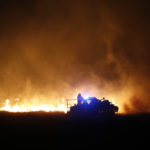Kansas volunteer firefighters underfunded when needed most

Firefighters from across Kansas and Oklahoma battle a wildfire near Protection, Kan., Monday, March 6, 2017. (Bo Rader/The Wichita Eagle via AP)
GREENWOOD, KAN. — Volunteer firefighters, who make up 90 percent of the firefighters in Kansas, are seeking additional funding.
Kansas spends about $300,000 at the state level on firefighting, less than almost any other state, the Wichita Eagle reported. This resulted in local firefighters having no extra help to fight the state’s biggest wildfire in March, which burned more than 450,000 acres in Kansas.
“A grassfire moves fast,” volunteer Brian Hind said. “The biggest fire we’ve (Greenwood County) ever had was 30,000 acres, and it was a six-hour deal. So when do you pull the trigger on when the state is going to help you? You don’t have two or three days; normally, you’re talking hours.”
Much of volunteer firefighters’ equipment often breaks down when most needed because of old age. Departments end up spending most of their training time repairing trucks because it’s too expensive to replace them.
“$10,000 is just for the truck,” volunteer Dwight Call said. “We still have to buy tanks, pumps, hoses, lights and nozzles and donate countless hours of labor to have a functioning grass rig.”
Because of the shrinking population in rural counties, there are fewer people who can volunteer.
“You have to look at the population of the state, especially in the rural communities, the volunteer base isn’t there,” Kansas State Firefighters Association President Kevin Flory said. “So manpower is a problem. The funding isn’t there, there is less tax base. So it’s getting harder … for these small communities to adequately fund these departments.”
Flory said firefighters get their money from local property taxes, so they would need to better advocate for the departments if they want more funding.
“If we had to depend on (Gov. Sam) Brownback for funding of our rural firefighting efforts, we’d still be fighting prairie fires with wet burlap bags, like my grandfather and his peers used to,” Hind said.







